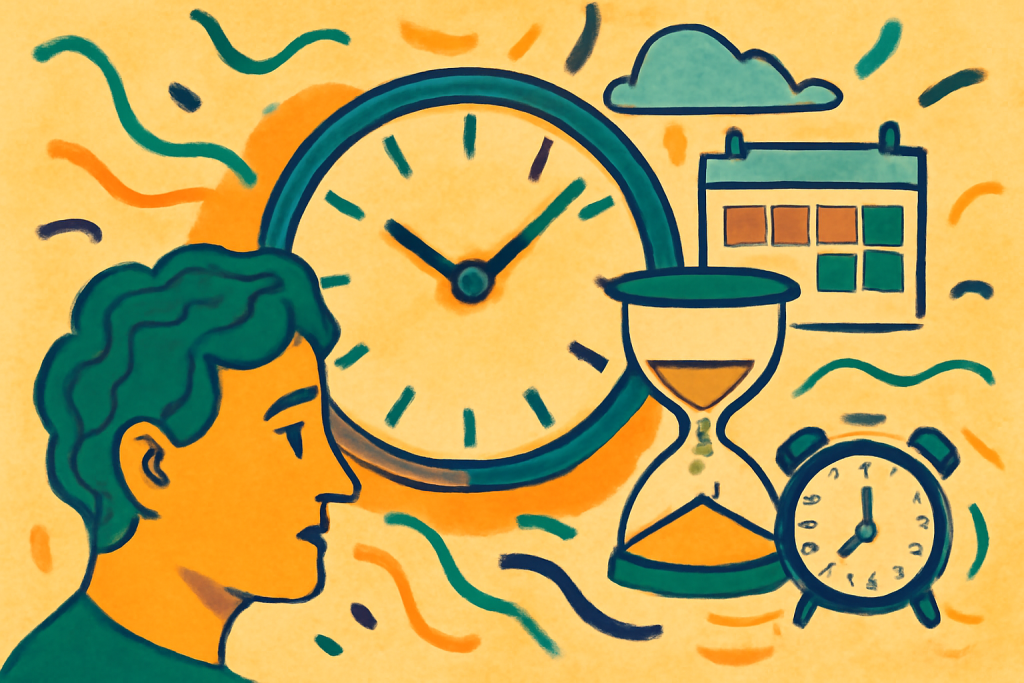Time perception governs how we experience life’s moments, yet it is surprisingly flexible and influenced by many factors. This article explores the psychology behind time perception, highlighting recent research on how modern life’s pace and digital environments are reshaping how we feel time passing.

Understanding Time Perception: A Complex Psychological Phenomenon
Time perception refers to how individuals sense and interpret the passage of time. Unlike clocks and calendars, human perception of time is subjective and can stretch or contract depending on our mental state, environment, and even biology.
- Subjectivity of Time: A minute waiting in line can feel eternal, while hours spent immersed in a hobby may fly by.
- Biological Bases: Internal “clocks” in the brain, particularly the suprachiasmatic nucleus and dopamine-regulated systems, help track time intervals, but are influenced by external stimuli (Wittmann 2016).
This fluidity shows that time perception is not fixed; it reflects a dynamic interplay between brain processes and situational contexts.
Emerging Trends: How Modern Life Alters Our Time Experience
In the 21st century, new research reveals that the way we live—accelerated by technology and digital media—affects our subjective experience of time in unique ways.
1. Digital Overload and Time Compression
The constant stream of information from smartphones, social media, and apps creates a sensation known as “time compression.” This means people feel like time is passing faster, sometimes too quickly to fully register experiences.
- Research shows high digital engagement correlates with a decreased ability to estimate time accurately (Lleras et al. 2020).
- The “attention economy” demands rapid switching between tasks, reducing sustained focus and altering temporal awareness.
This has practical consequences, including increased stress and diminished mindfulness in daily activities.
2. The Role of Anxiety and Stress in Distorting Time
Fast-paced environments, pandemic-related uncertainties, and personal stressors contribute to distorted time perception.
- Anxiety tends to make time feel elongated or slowed during negative experiences.
- Conversely, boredom or disengagement can accelerate time perception, making periods seem to “fly by” but leave us feeling empty.
Understanding this connection helps explain why some moments during crises feel never-ending, while others seem to disappear.
3. The Impact of Age and Memory on Time Perception
Older adults often report that time seems to move faster than in youth. Scientists propose this arises from differences in memory encoding:
- Fewer novel experiences reduce the number of distinct memory markers, making past periods appear shorter.
- Engaging in new activities can slow perceived time by increasing memory density.
This trend has encouraged researchers to promote “time expansion” techniques through enriched environments and novelty-seeking behaviors.
Practical Implications: Can We Influence Our Time Perception?
Understanding the psychology behind time perception is more than academic curiosity; it offers ways to improve wellbeing and productivity.
Strategies to Slow Down Subjective Time
- Mindfulness and Meditation: Training attention in the present moment increases temporal resolution, helping us savor time (Wittmann 2016).
- Limiting Multitasking: Focused, single-task work enhances time awareness and reduces time compression.
- Novelty Seeking: Trying new activities and learning keeps memory systems active and slows time perception.
- Digital Detox: Reducing screen time helps combat digital overload, improving temporal clarity.
By applying these practices, individuals can regain a sense of control over their experience of time.
The Future of Time Perception Research
Scientists are now leveraging neuroimaging and virtual reality to explore how environments and mental states shape time perception.
- VR studies simulate altered environments to observe real-time changes in time perception.
- Neurochemical research into dopamine’s role in timing could lead to treatments for disorders with distorted time sense, such as ADHD or depression.
As technology and lifestyle continue to evolve, so too will our understanding of the psychology behind time perception.
Conclusion
The psychology behind time perception reveals that our experience of time is deeply subjective and shaped by biological, psychological, and environmental factors. Modern life—with its digital stimuli and stressors—introduces new challenges to how we perceive and manage time. However, by understanding these mechanisms, we can adopt strategies to better regulate our temporal experience, enhancing our mental health and life satisfaction.
References
- Wittmann, M. (2016). The inner experience of time. Philosophical Transactions of the Royal Society B, 371(1697), 20160066. https://doi.org/10.1098/rstb.2016.0066
(In-text citation: Wittmann 2016) - Lleras, A., Cavina-Pratesi, C., & Pisella, L. (2020). Digital distractions and temporal perception: How constant connectivity alters time awareness. Journal of Experimental Psychology: Human Perception and Performance, 46(9), 947–958. https://doi.org/10.1037/xhp0000723
(In-text citation: Lleras, Cavina-Pratesi and Pisella 2020) - Zakay, D., & Block, R. A. (1997). Temporal cognition. Current Directions in Psychological Science, 6(1), 12–16. https://doi.org/10.1111/1467-8721.ep11512641
(In-text citation: Zakay and Block 1997)









